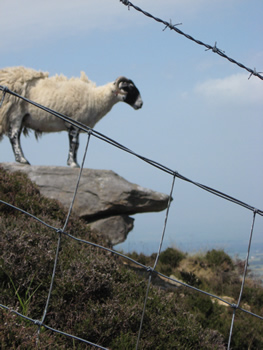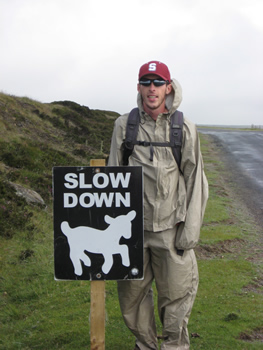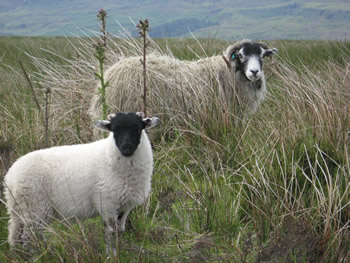Altruism:
The World of Nature Points to the Way of Grace
For Sunday April 29, 2012
Lectionary Readings (Revised Common Lectionary, Year B)
Acts 4:5–12
Psalm 23
1 John 3:16–24
John 10:11–18
Last summer my wife and I celebrated our thirtieth wedding anniversary by hiking 192 miles coast-to-coast across northern England. We followed the Wainwright Walk, rated by many guidebooks as one of the best walks in the world. Our first day began in howling wind and rain on the cliffs of St. Bees on the Irish Sea. Sixteen days later we arrived at Robin Hood's Bay. We dipped our boots into the North Sea, tossed our pebble into the water, then signed the official "C2C" finisher's registry at the Wainwright Bar in the Bay Hotel.
We loved so many things about the hike. The route passes through three national parks — the Lake District, the Yorkshire Dales, and the North York Moors, each gorgeous in its own way. We experienced the wettest part of England; cleverly-named Sprinkling Tarn averages 185 inches of rain a year. Historical sites like the Richmond Castle (founded in 1071) and Shap Abbey (founded in 1199) dotted our path. We also learned some fun Britishisms like "get a wiggle on" ( = hurry up). Evening pub life made us wish for something similar in America.
One surprise were the thousands of sheep. There wasn't a single day that we didn't see hundreds of sheep. Road signs with lamb silhouettes urged cars to slow down. Another sign warned dog owners about "sheep worrying." I'll always remember hiking into Patterdale late one afternoon. As we passed through yet another sheep pasture, a farmer encouraged us to stick around to "see some action." A few minutes later he unleashed three border collies that herded the sheep across a stone bridge and into a different pasture. Watching those dogs work gave me goose bumps.
Three of the four readings this week compare our relationship with God to that of a shepherd and his sheep. David's famous Psalm 23 exudes confidence in God's care despite the shadow of death, the specter of evil, and threats from his enemies. "I shall lack nothing," he says, "for you are with me." God sees and cares. He knows what we need. And in John 10, in one of his seven "I am" statements in which he echoes Yahweh's divine name revealed to Moses ("Tell them 'I am' sent you"), Jesus depicts himself in the same way that David describes Yahweh in Psalm 23: "I am the good shepherd."
Jesus deepens God's promises of comfort, care, and protection. He emphasizes divine love expressed in self-sacrifice. A good shepherd is far better than a hired hand. The hireling doesn't own the sheep, doesn't really care about the sheep, and runs at the first whiff of danger. He only wants a paycheck. The owner of the sheep is different. He'll do anything to save his sheep. "The good shepherd lays down his life for the sheep," says Jesus about himself. This depiction of self-sacrifice recurs five times in this week's gospel, and then a sixth time in John's epistle: "Jesus Christ laid down his life for us."
John's epistle then draws the obvious corollary: "And we ought to lay down our lives for one another." In his own self-sacrifice for all the world Jesus gave us an example.
Confession of faith in Jesus leads to imitation of the life of Jesus. How can we claim genuine faith without authenticating action, asks John? Words lead to deeds: "This is his command: to believe in the name of his Son, Jesus Christ, and to love one another as he commanded us." Religious faith is often self-referential. John's "command" about the human imitation of divine self-sacrifice is a needed reminder. He mentions sharing material possessions with those in need. That's only one of many applications of a broader principle that's rich with implications.
But is self-sacrifice and altruism a wise way to live in the world?
In a strictly evolutionary scheme of the survival of the fittest, conflict and competition are not only natural but good and necessary. Animals pass on their genes thanks to selfishness, not generosity. Darwin admitted that altruism was a "potentially fatal challenge to his theory of natural selection." Self-sacrificial behavior that places the needs of others ahead of your own looks like a recipe for extinction. Thus the title of Richard Dawkins' famous book, The Selfish Gene.
Nonetheless, nature presents us with a paradox: "altruism is everywhere," writes Jonah Lehrer, "a stubborn anomaly of nature." He gives several examples of this well-known phenomenon. Vampire bats aren't just bloody predators; they survive by sharing food with the entire colony. Honey bees are famous for their division of labor for the greater good. Birds raise offspring that don't belong to them.
E.O. Wilson of Harvard argues that ants are one of the most successful forms of life precisely because of their shared sacrifice and cooperation. Similarly, the evolutionary biologist Joan Roughgarden of Stanford believes that Darwin was wrong about universal sex roles in which aggressive males seek passive females in a competition of perpetual conflict. She believes that cooperation and interdependence are as important in nature as conflict.
Altruism in nature is a simple fact, but why it exists is hotly debated. E.O. Wilson adopts an argument made by Darwin himself. Although selfishness within a group is advantageous, and altruism is deleterious for an individual, generosity and self-sacrifice are advantageous for group survival. "Altruistic groups beat selfish groups," says Wilson.
In this instance, nature points to grace. Jesus gave himself up for us, a single individual for all the world, and he asks us to do the same.1
[1] See Jonah Lehrer, "Kin and Kind: A Fight About the Genetics of Altruism," The New Yorker (March 5, 2012), pp. 36–42.
Image credits: (1–3) Dan & Patty Clendenin, England, 2011.








